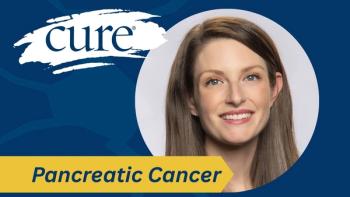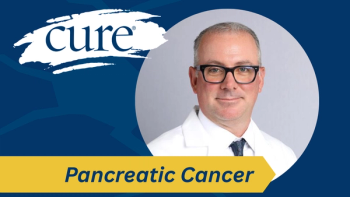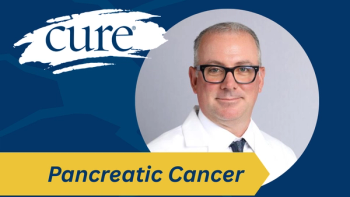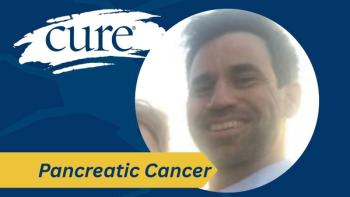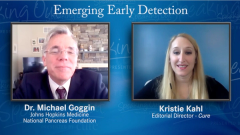
Starting the Conversation
Kristie L. Kahl: What kind of questions should patients be asking when they're told of their pancreatic cancer diagnosis?
Dr. Michael Goggin: One of the challenges is it's often a devastating diagnosis to patients and their family members; thye can be stricken with emotion and a lot of uncertainty. And it's a grim diagnosis for many. It matters a lot what stage the pancreatic cancer is at. That is one of the factors that determines management and, ultimately, whether or not cure is possible.
The goals of care are very important. What does someone want? And that, of course, is tied into how likely is it that they would benefit from treatment. And another important factor is what is their overall health. Sometimes if pancreatic cancer is occurring in somebody who has other chronic diseases, or if it's the case that the cancer has been detected at a very advanced stage and person has become quite poor in terms of their overall functioning, then the appropriate management differs very much. It may be just simply a question of supportive care. But it manifests very differently in each individual.
For many, it's been the case, historically, that often patients are undertreated, that the diagnosis comes along, and oh, gosh, it's pancreatic cancer and I don't want to die in pain, or I don't want to have a miserable end of life. And without appropriate questioning about what can be achieved in all likelihood, patients are often undertreated. That is including, for example, folks who may have less access to care, maybe sometimes minorities. That's what the literature would suggest that, although, we don't want to put people through unnecessary therapies that have minimal benefit. In fact, it's often the opposite, that patients will tend not to get as much care that can be helpful in improving their quality of life, improving their outcome, even with what is often in advanced disease.
It is worthwhile to ask questions about what can be reasonably achieved in the context of what the individual's goals of care are. And again, their overall performance status. So treatment is very different. If someone, for example, has a small, potentially stage 1 pancreatic cancer, those patients can have a five-year survival of 80%, and the majority of them would go on to be cured. And that very important to realize that, despite the grim statistics, to detect early is really significant.
Patients on the other end of the spectrum may have advanced cancer, depending on the nature of that cancer. In some people, those cancers may be very sensitive to chemotherapy. And we can understand that sometimes by the genetics, either sampling the cancer or to a certain degree by gene testing, they have an inherited mutation. That can sometimes suggest at least a significant chance that they might respond dramatically to therapy. Most people, of course, fall in between and they have a cancer that may be operable and that operation may have to start with chemo radiation. Maybe they're trying to figure out if that is worthwhile, and we do find that patients can achieve often good long-term survival, even if they have local cancers that may have just spread to lymph nodes.
There is still a lot to be done, and the trends have been some improvements in survival. If they have more advanced cancer, you know, what else can be done, because one of the concerns that patients will have is they're hoping that they won't have to suffer, they're hoping that things can be done to help them. And, if you go to the right centers, where expertise is available, patients can have symptoms treated, improving quality of life…There are therapies that can provide a lot of supportive care medications as well. So it's not just one conversation, because the first step of diagnosis is not only understanding where the person is with respect to their tumor, and what their overall fitness is, and what their goals of care, and then how are they going to respond, because they may be in care for several years, trying to do the best they can, taking advantage of emerging therapies and figuring out what their long-term benefits of therapy might be. I think it's an initial question about what the situation is, their diagnosis is at the beginning, but hopefully establishing a relationship and realizing that with appropriate care, a lot of patients can sustain a good quality of life.
Kristie L. Kahl: Would you recommend a patient to seek a second opinion?
Dr. Michael Goggin: It is not unusual for patients to benefit from a second opinion at an expert center. It is a little bit of a judgment one has to take, because maybe you have to travel. But there is some medical complexity and sometimes the local care is not optimal for pancreatic cancer management. There are pancreatic cancer experts who do this all the time, and they're going to have some advantages. Even sometimes, whether a cancer is operable or not, that's a very fundamental question because that can set up significant differences in long-term outcome. Sometimes, a second opinion may be appropriate if the person is thinking about a clinical trial. So it'll be different for different individuals and what they wish to do. A lot of people want and really need to have care locally. But even then a second opinion can help guide local therapy. So it doesn't always happen that every time you offer a second opinion, of course, it is going to make a big difference. But we have multidisciplinary conferences, and it's a common aspect of that is that people are coming for a second opinion and sometimes it does change management for the better.
Kristie L. Kahl: Why are conversations with health care providers within the multidisciplinary approach so important?
Dr. Michael Goggin: You can imagine if you have somebody who has been a pancreatic cancer nurse for a decade or more the invaluable experience that they would have as compared to somebody who isn't a general oncology service who sees a variety of patients. They're just going to be more expert on dealing with many of the symptoms and challenges and there is a lot of care that can be offered to patients that if the oncologist alone had to lead on everything, they wouldn't be able to do it as well. So often the nurses and other medical professionals, for example, mentioned about the genetic counseling and some in some centers that may be even handled somewhat by oncology nursing. But one of the things we encourage nowadays is getting a gene test to help decide whether or not your pancreatic cancer has run in your family, not only may that have impact on your care, but more importantly, it helps understand for your family members, whether or not they would benefit from getting a gene test themselves, because that can help them manage their own cancer risk. And so sometimes that's in the context of genetics, counselors, clinicians with genetics expertise, and sometimes even the nursing experts come in to that, depending on what your care is, has been, whether it's surgical nursing, or oncology nursing. There is a lot to offer. They provide pain management and nutritional care, all of these things come in the wheelhouse of the non-oncologist. It's not that the oncologist isn't very supportive of these things. These folks as members of their team, they want to be able to make decisions about targeting the cancer. So allied health professionals can be as important in ensuring long-term survival and effective communication about where their care is, as the oncologists themselves.
Kristie L. Kahl: What role does the caregiver play when it comes to starting these conversations with a multidisciplinary approach care team?
Dr. Michael Goggin: Well, caregivers have a tremendous role to play, not only in the management of cancer, but we've even seen some evidence that caregivers, if you're married, for example, you're more likely to have a pancreatic cancer detected early, like a stage 1 pancreatic cancer. And that speaks to the fact that caregivers are very good at helping to ensure that their partner follows through on cancer prevention screening steps, or if they present with symptoms that they go to the doctor early, even though sometimes patients present with symptoms of pancreatic cancer, they may already have an advanced cancer, but sometimes it is going to be a stage 1 cancer if they have access care and gotten a CT scan quickly.
What we found is that stage 1 cancers are seen more often in people who were married. And the assumption being that the caregiver may have been instrumental in some cases, and ensuring early access to care is not just the caregivers role. It's your insurance, and it's many factors, your education, but the caregiver is really vital, because, you know, patients can always understand where their symptoms are, and what opportunities there are, dealing with their symptoms, and knowing whether or not they should be getting a second opinion or many different aspects of care. We mentioned, it's not only about treating the cancer, and it's, you know, it's taking care of the nutrition, diabetes, pain and nausea and exercise. Any of these things require not only a team but a caregiver kind of helping the quarterback, everything.
Kristie L. Kahl: How can patients also talk to their families about their diagnosis?
Dr. Michael Goggin: Talking to family members is vital because pancreatic cancer helps someone identify if they are at risk themselves, whether it's a sibling or a child, it's very common for us to meet somebody who all of a sudden wants to get their pancreas surveillance started because their their sibling developed pancreatic cancer in the last year.
It's a sobering reality for them, but on the other hand, sometimes families don't communicate well, and they may not be always aware of their family history. So individuals with pancreatic cancer can help their family members by giving them that knowledge, that power. They may feel like they don't want to burden their family members, but they really are providing them with useful information about their cancer risk. Thankfully, most people with pancreatic cancer aren't going to be part of a campaign or a cancer family where it's affecting many individuals in the family, but it does. It does provide them with an opportunity to check so they may then go and get a gene test and while at least done my due diligence to make sure if there was something that I should know about if a mutation in a gene running in my family that I've checked it out, and you know, they've done whatever they can.





